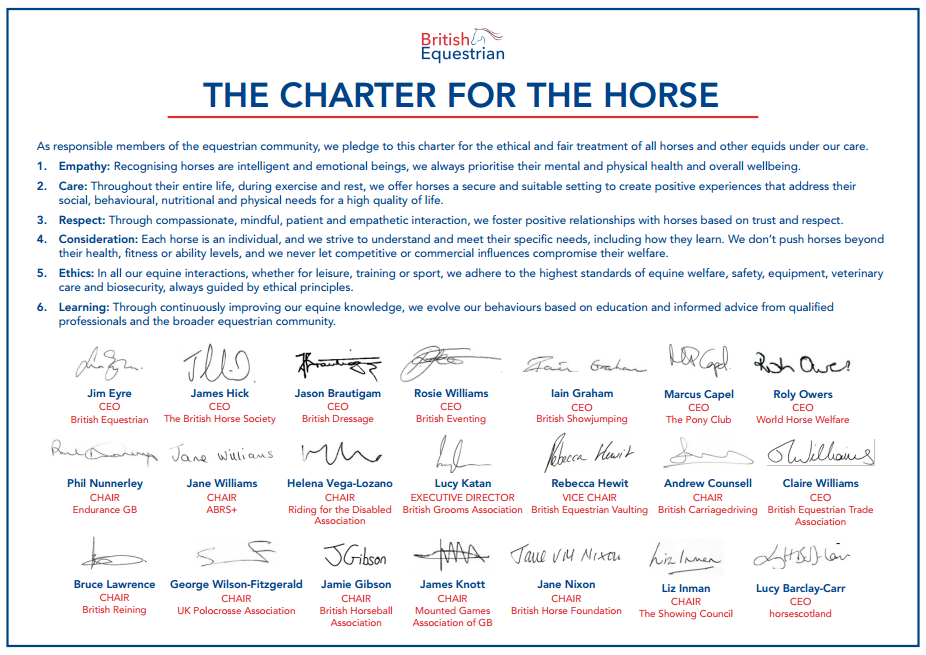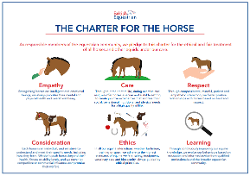Ethics and welfare
The welfare and wellbeing of our horses and all other equids is paramount to all of those who interact with them. At British Equestrian, we work with our member bodies, and in turn their members, to ensure the very best standards and excellence in their care, treatment and use in sport, hobby or leisure activites.
The Charter for the Horse
Launched in March 2024, the Charter for the Horse is a pledge to be adopted by all across the equestrian sector to underpin our committment to safguarding the mental and physical wellbeing of our equids. All 19 of the British Equestrian member bodies have signed up to the Charter and we'll collectively work towards the highest standards in the six key areas of:
- Empathy
- Care
- Respect
- Considertation
- Ethics
- Learning
Click the link below to download a poster version of the charter, then display it on your tackroom wall or venue notice board to show your commitment to our horses. Collectively, we all have a responsibilty to our horses, let's shout about our dedication to our equine and equid partners.
British Equestrian rule Book
Welfare expectations are laid out in the British Equestrian rule book, which applies to all our member bodies (whose activities cover a myriad of equestrian activities) and international athletes and officials acting under the Federation.
CODE OF CONDUCT – THE WELFARE OF THE HORSE
The rule book is currently undergoing extensive review and consultation in the area of equine welfare and ethics, and will be launched in 2025.
our Equine Welfare and Ethics Advisory Group
The Equine Welfare and Ethics Advisory group is an independent body to provide guidance and recommendations in the key strategic area of equine wellbeing and standards. They work to provide evidence-based best practice, make recommendations on critical issues within equestrian sport and develop guidance to promote an ethical horse-human relationship.
Key areas of responsibility:
- Identifying key threats and challenges, both real and perceived.
- Identify and collate current issues and consider scientific evidence to support best practice.
- Provide a Federation-wide strategic overview of equine care, wellbeing and welfare in sport.
- To identify areas in which further research is needed and identify research priorities.
- Advise and make recommendations on areas where rule changes should be considered.
- Advise British Equestrian on response to welfare issues.
- Consider mechanisms for systems of equine safeguarding reporting.
- Engage and collaborate with member bodies in the promotion of equine and wellbeing messaging, content and best practice, and strategic reputational work.
The Group’s composition is representative of expert roles in equestrian sport, equine veterinary science and governance to ensure there is a balance of viewpoints and any recommendations are appropriate and workable. Appointed members of the group are:
- Independent Chair: Professor Madeleine Campbell BVetMed (Hons) MA (Oxon) MA (Keele) PhD DipECAR DipECAWBM (AWSEL) MRCVS
- Jim Eyre, British Equestrian Chief Executive
- Roly Owers MRCVS, British Equestrian Board Director and World Horse Welfare Chief Executive
- John McEwen MBE, BVMS MRCVS, BEF Director of Equine Sports Science and Medicine
- Richard Waygood MBE, British Equestrian Technical Director
- Iain Graham, British Showjumping Chief Executive
- Sarah Phillips, BHS Chief Operating Officer
- Lynne Bailey, British Equestrian Head of Integrity and HR
- Winnie Murphy, British Equestrian Head of Communications.
FEI Equine Ethics and Wellbeing Commission
Established in June 2022 in response to growing societal concerns related to the use of horses in sport, the Equine Ethics and Wellbeing Commission (EEWC) is an indpendent group established by the FEI. They look at equine welfare, the impact of equestrian activities on the environment and resource usage and have been tasked with safeguarding equine welfare through ethical, evidence-based policy and practices.
At the FEI General Assembly in November 2022, the delivered their first presentation detailing six priority areas of focus:
- Training, riding, tack and equipment
- Recognising physical and emotional stress
- Accoutability, enforcement and knowledge
- The other 23 hours
- Competitive drive – the horse as a number
- Not fit to compete, masking heath problems.
The also provided insight frrom two large scale surveys they commissioned:
EEWC – EQUESTRIAN STAKEHOLDERS SURVEY REPORT
This was followed up by their vision for ensuring the future involvement in sport at the FEI Sports Forum in April 2023 – 'A good life for horses'.
Visit the EEWC Key Documents hub for further details of thier work.

